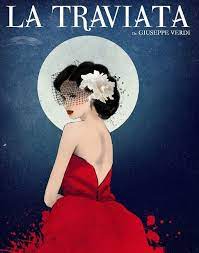The older I get, the more I believe that fashion rules all. Consider even narrative plot lines, surely the result of individual literary inspiration, and yet certain structures come in and out of favor. Where now are the revenge tragedies beloved of the Elizabethans and the Jacobeans? Or the "good" versus "bad" girl plot lines that populated so much fiction in the 'Fifties? Tastes change in plot, in characters, in theme.
I started thinking along these lines during a long car trip to Chicago. On the way out, Tristan and Isolde was playing on Met Opera Radio and on the way back, La Traviata. In both, helpful folk interfered in the action to disastrous effect. They were meddlers, in short, and meddlers were once a staple of drama and narrative.
Consider the most famous of all Greek dramas: Oedipus Rex. Oedipus is a man of misfortune literally from birth, when the oracle predicted that he would kill his father and marry his mother. His distressed parents, being of ruthless disposition, had the child exposed to die on a nearby mountain. Thus would have ended the story of Oedipus, had not a kindly shepard saved the infant, delivering him to the King and Queen of Corinth and so precipitating the tragedy and confirming the inescapable nature of fate.
Disastrous help was not confined to the fatalistic Greeks by any means. The ancient Irish had their own version in a story that Wagner used for Tristan and Isolde. Tristan, a warrior who has killed Isolde's intended, is escorting her to his leige lord King Mark. Isolde and the King are to be married as part of a peace settlement. Furious about the death of her beloved, Isolde tells her friend/servant Brangaene to prepare a poison drink, which she intends to share with Tristan, killing them both.
Brangaene, however, substitutes a love potion intended for Isolde and King Mark's wedding night.
Tristan and Isolde are soon in each other's arms and the tragedy is well underway.
Undeterred by all this bad luck, Shakespeare's Friar in Romeo and Juliet comes up with a strategem to help the lovers. Juliet drinks a powerful sleeping potion, and her family, believing her dead puts her in her tomb, where Romeo, who hasn't gotten word of the plot, kills himself out of grief. Juliet, awakening, follows him into death.
A couple of centuries later, Alexandre Dumas fils wrote La Dame aux Camélias, which Verdi turned into the ever popular opera, La Traviata. Against her better judgement, Violetta, the brilliant young courtesan, falls in love with the poet Alfredo Germont. She gives up her life in Paris and uses her fortune to live quietly in the country with him, hoping for a time of happiness before she succumbs to consumption.
All is well until she is visited by Alfredo's father, who is concerned that his son's scandalous liason will harm his sister's marriage prospects. Good-hearted Violetta at last agrees to leave her love, and, as any attentive reader can easily guess, unexpected consequences ensue. Alfredo, not being privy to his dad's machinations, insults Violetta at a party, bringing down the wrath of his father, public disapproval, and a challenge to a duel from Violetta's protector Baron Douphal that might have had a fatal outcome.
Germont and Brangaene, the friar and the shepherd – where are their like now? We have fewer stories about royals with faithful servants and the last old indulgent children's nurse I came across was Nan in my own Francis Bacon series. Are helpful bystanders rarer now in our divided culture or do our novelists and dramatists no longer feel the need to emphasize the inescapability of fate, which so haunted the ancients?
Either way, for the moment at least, literary meddlers are out of favor.
The Falling Men, a novel with strong mystery elements, has been issued as an ebook on Amazon Kindle. Also on kindle: The Complete Madame Selina Stories.
The Man Who Met the Elf Queen, with two other fanciful short stories and 4 illustrations and The Dictator's Double, 3 short mysteries and 4 illustrations are available at Apple Books.

